As technology advances, the way we approach education is rapidly changing. One of the latest innovations to hit the scene is chatbots.
Yes, you read that right - chatbots are not just for customer service anymore! They are revolutionizing the educational sector in ways we never thought possible. Chatbots are computer programs that simulate human conversation, answer questions, and carry out tasks.
In education, they are being used to support students, teachers, and administrators in various ways. From assisting with administrative tasks to providing personalized learning experiences, chatbots are changing how we approach education.
They can answer student questions quickly, monitor student progress, and even help with test preparation. Teachers can use chatbots to automate administrative tasks, such as grading assignments and providing feedback, allowing them to focus more on teaching and less on paperwork.
In this blog, we'll explore how chatbots are revolutionizing the educational sector, providing insights into the benefits of this emerging technology. We'll dive into specific examples of how chatbots are being used in the classroom and the potential impact they could have on the future of education.
So buckle up and get ready to learn about the exciting ways chatbots are transforming education as we know it.
Why do we need chatbots in the education industry?
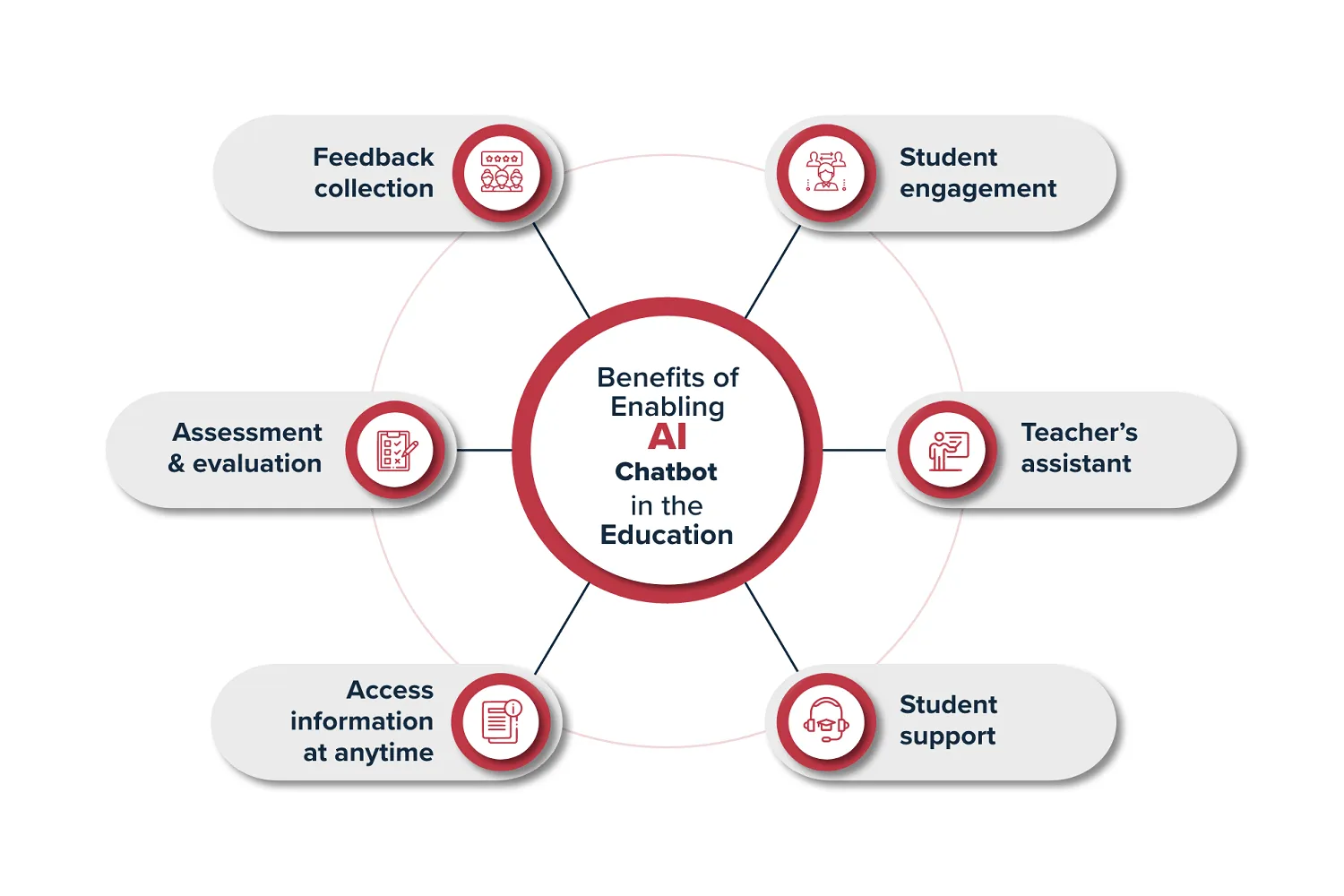
The education industry constantly evolves, and introducing chatbots has brought significant changes.
Accessibility and Convenience
Chatbots provide students with round-the-clock access to information and support, making education more accessible and convenient. They can provide students with quick answers to questions and offer support whenever needed, regardless of time and location.
This level of accessibility and convenience is particularly beneficial for students who are studying remotely or have busy schedules.
Personalized Learning
One of the biggest advantages of chatbots in the education industry is their ability to provide personalized learning experiences.
By using data analytics, chatbots can identify areas where a student may be struggling and provide targeted support to help them improve.
This personalized approach to learning can help students achieve better results and feel more engaged with the material.
Administrative Support
Chatbots can also help to reduce the administrative burden on teachers and school administrators.
They can automate tasks such as grading, scheduling, and even providing feedback, allowing teachers to focus more on teaching and less on paperwork.
This improves efficiency and allows for a more personalized approach to education.
Cost-Effective
Chatbots are a cost-effective solution for schools and universities, particularly those with limited resources. They can support students and teachers at a fraction of the cost of hiring additional staff members.
Additionally, they can help reduce the need for expensive textbooks and other resources, providing students with a more affordable and sustainable option.
Improved Engagement
Finally, chatbots can improve student engagement by providing a more interactive and engaging learning experience.
Using chatbots to gamify learning or provide interactive quizzes and activities, students can become more engaged and motivated to learn. This can lead to improved academic performance and greater overall satisfaction with the education experience.
How can chatbots be used in education?
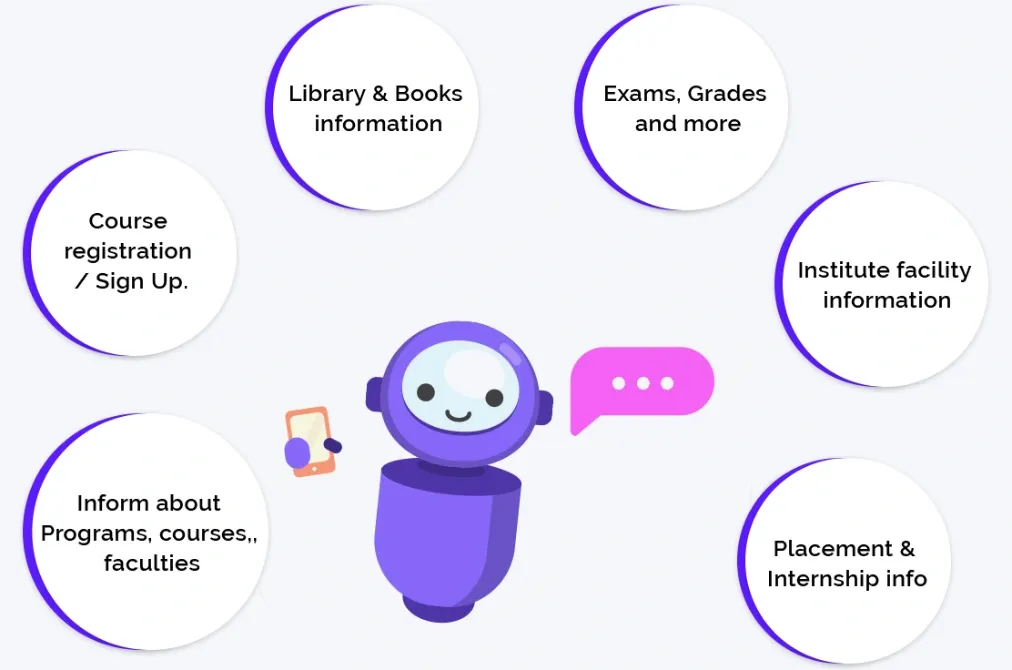
Here are a few industry-specific applications of educational chatbots from the many use cases of chatbots. Institutes requiring assistance with any of the following use cases can use chatbots successfully.
Virtual personal tutoring
AI chatbots can pay close attention to students and their learning habits. They can closely observe the pattern of studying and content consumption and, based on that, help students excel in their fields.
Intelligent tutoring systems allow schools to provide personalized learning experiences. Not all students understand and learn similarly, and some may even have disabilities. Chatbots can customize the learning plan and ensure that students gain maximum knowledge- in and out of the classroom. They assist students with all study materials as and when they are required.
Student assistance
People opt for distance corporate training and courses to upskill without taking time away from their jobs and families.
This expansion necessitates a strong student support strategy for educational institutions. Questions from students before enrollment, during, and after the course must be prioritized and resolved as soon as possible.
Educational chatbots can greatly assist in providing excellent student support and immediate answers to students' questions.
Teacher's assistant
The majority of the work that teachers undertake is routine and repetitive. Examples are keeping track of student attendance, grading exams, or assigning homework.
As teachers' assistants, chatbots can easily complete repetitive tasks. Chatbots with artificial intelligence can help teachers justify their work without wearing them out too much.
Feedback gathering
No matter what business you work in, gathering feedback regularly is critical.
There is a large amount of data on which educational institutions require feedback. Schools can gather data on every area, from instructors to curricula, admissions to hygiene, and rise to the top of their Industry.
Chatbots in the education sector can help gather feedback from all stakeholders after completing each discussion or process. It can help schools collect important data and address issues that lead to poor outcomes.
Repository of data
Chatbots serve as both a data delivery and data gathering tool for the education sector. Students can submit their information and feed data to obtain the required results. Teachers can also use them to instantly deliver lessons and other essential information to all of their students.
Automation in data collecting and distribution lowers the possibility of errors while enabling a round-the-clock operation.
Institutions can make decisions, solve problems more easily, and draw illuminating conclusions when all the data is in one location.
Suggested Reading
5 ways educational chatbots can make students' lives easier!
How can website chatbots benefit Universities & Higher Education Institutions?
AI chatbots are the most popular educational technology among students, staff, and the community. However, why is every organization rushing to implement AI chatbots? Or, to be more exact, how crucial it is for the education sector to use AI chatbots.
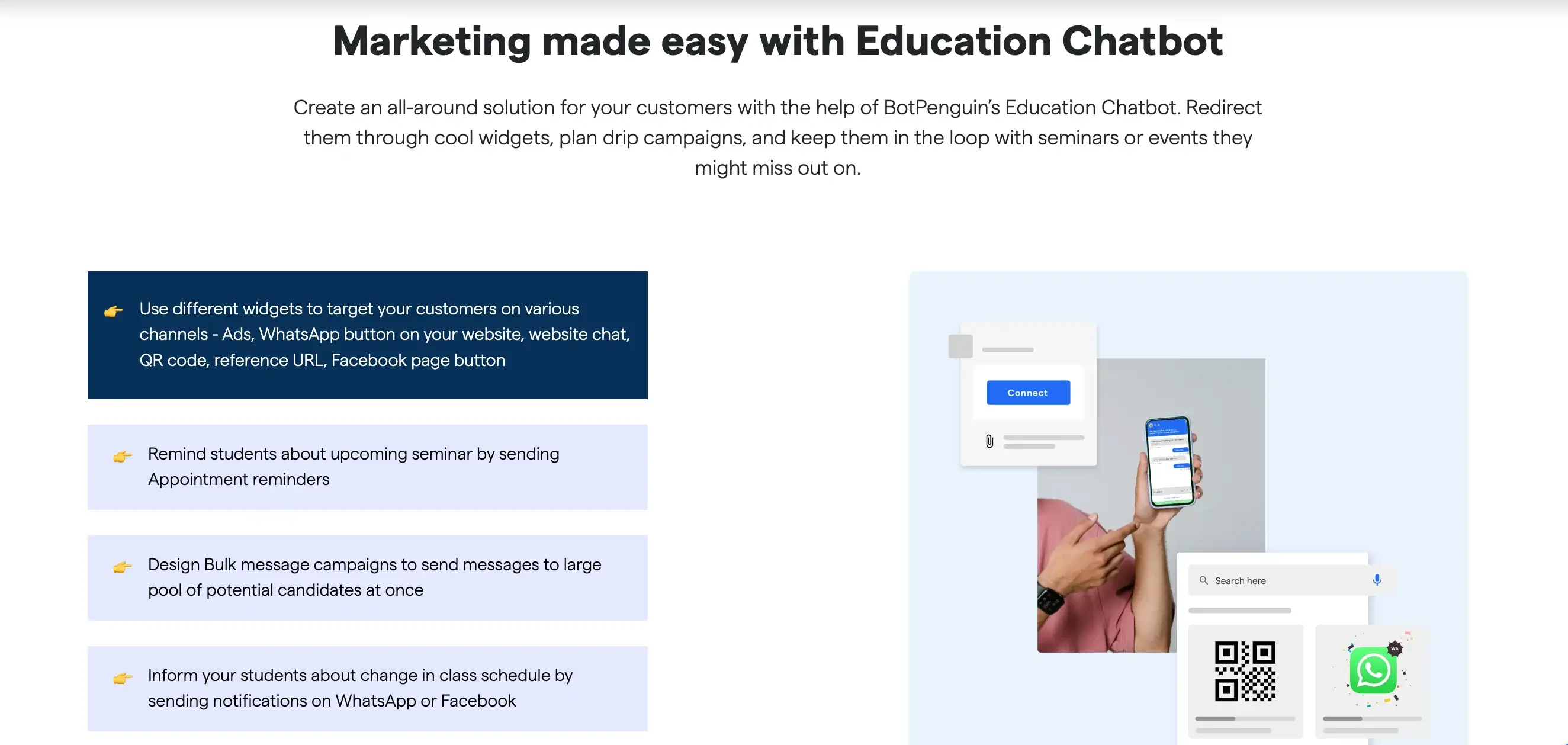
Smart content creation
A great study guide should include every idea needed for the target age group. In addition, there should be sufficient exercises for the students to practice.
The creation of such content can be difficult for the government. To improve learning processes, AI chatbots can assist in framing the subject matter in a student-friendly manner.
Therefore, by providing students with superior content, these chatbots can play a key role in transforming the present educational landscape and transforming students into better individuals more quickly.
Grading and evaluations
Let's be honest: a formal learning process includes grades, assessments, and scores. Every educational organization must manage them, analyze the outcomes, and create report cards, which can be difficult.
AI chatbots can also be quite helpful in this situation. We know that digital solutions are the greatest instruments for managing exams. Chatbots, though, are a step ahead.
They simply organize the evaluations and record every response to gather useful information about the students.
Provide preparation advice
The traditional education model includes a series of exams and report cards that assess students' progress. However, none of these result cards include suggestions for how the student can improve and earn higher grades. Right?
As a result, many students find it difficult to improve their performance in successive exams and perform nearly consistently every time. AI chatbots are a game changer in this scenario.
They can assess students' performance and provide preparation tips to help them improve and achieve high marks in upcoming exams.
Information is available immediately.
The chatbots have an enormous library. They can store all information, summarized points, live lectures, and important questions about all concepts. A student can access these insights at any time using the interactive interface.
Assume a student has an examination in an hour. Unfortunately, he cannot recall a specific concept and must rely on a teacher to assist him in recalling it. An AI chatbot can give him instant access to all information and summarized points about the concepts, allowing him to achieve high exam scores.
Examples of Chatbots being used in the Industry
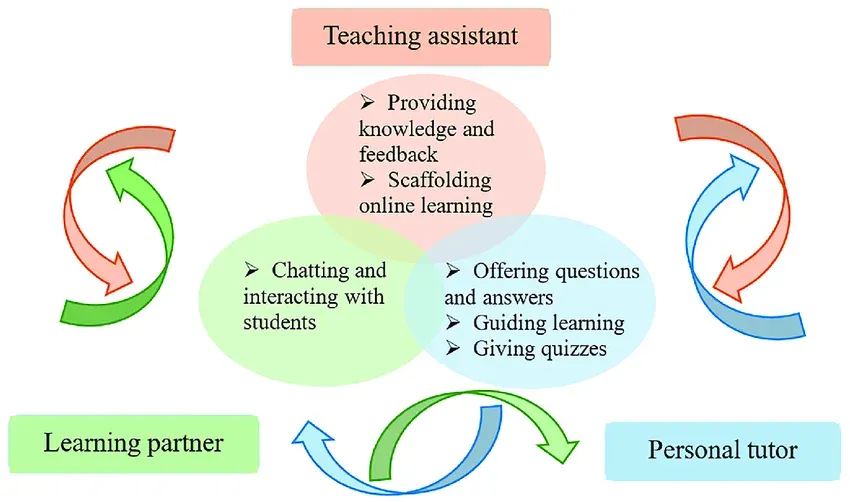
Socratic chatbot
Socratic chatbot is a popular chatbot that provides students with homework assistance.
The chatbot uses artificial intelligence (AI) to analyze a student's question and provide relevant explanations, videos, and step-by-step solutions. Socratic chatbot is available on the web and both iOS and Android platforms, making it easily accessible for students.
Tutorbot
Tutorbot is an AI-powered chatbot designed to help students learn English. The chatbot uses natural language processing (NLP) to understand a student's level of proficiency and provide personalized learning experiences.
Tutorbot also includes gamification features that make learning fun and interactive. The chatbot is available on Facebook Messenger and Telegram, making it accessible to students across the world.
Studybot
Studybot is a chatbot designed to help students revise for exams. The chatbot sends students questions and prompts to help them review their course material.
Additionally, Studybot can provide students with feedback on their answers and identify areas where they need to improve. Studybot is available on Facebook Messenger and Slack, making it convenient for students to access wherever they are.
Challenges of Implementing Chatbots in Education sector
While chatbots have the potential to revolutionize the educational sector, there are several challenges that need to be addressed in order to effectively implement this technology.
In this section, we will explore two of the main challenges: cost of implementation and data privacy and security concerns.
Cost of Implementation
One of the main challenges of implementing chatbots in education is the cost of development and maintenance.
Educational institutions may not have the resources to invest in chatbot technology, especially if they are facing budget constraints.
Additionally, the lack of technical expertise among staff can increase costs, as they may need to hire outside consultants to develop and maintain the chatbot.
However, there are ways to mitigate these costs. For instance, educational institutions can partner with chatbot development companies specializing in educational chatbots.
These companies may offer more affordable solutions customized to the institution's specific needs. Additionally, educational institutions can leverage open-source chatbot frameworks, which can be customized to meet their needs at a lower cost.
Data Privacy and Security Concerns
Another challenge of implementing chatbots in education is data privacy and security concerns.
Chatbots may collect and store sensitive information about students and teachers, such as their academic records, personal details, and communication history.
Educational institutions must ensure that data is protected and used ethically and that there are mechanisms in place to prevent unauthorized access.
Third-party chatbot providers may also have access to sensitive data, raising concerns about data ownership and control.
Educational institutions must carefully evaluate chatbot providers before entering into a partnership to ensure that they are aligned with their privacy and security policies.
With all the heavy work of chatbot development already done for you, move forward to setting up a top-notch chatbot for your education business with features like:
- Marketing Automation
- WhatsApp Automation
- Customer Support
- Lead Generation
- Facebook Automation
- Appointment Booking
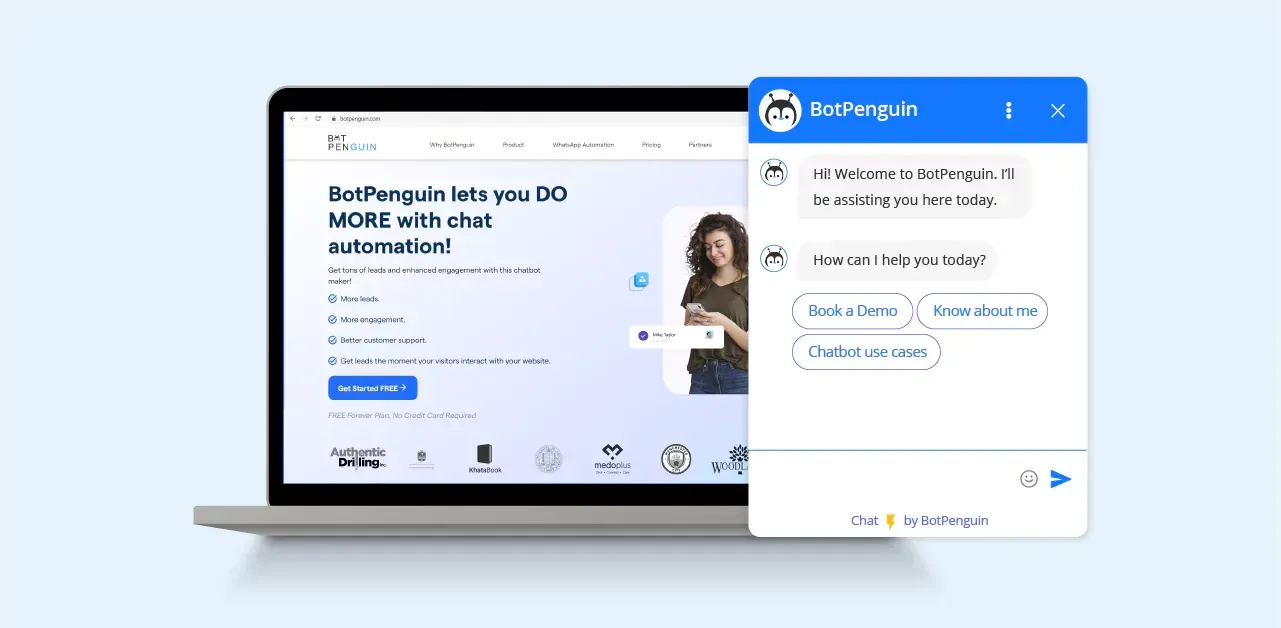
Conclusion
In conclusion, chatbots have become an essential tool in the education industry, providing numerous benefits and advantages for students, teachers, and administrators alike.
From improving accessibility and convenience to providing personalized learning experiences and administrative support, chatbots are changing the way we approach education.
As the demand for chatbots in education grows, it's important to choose the right chatbot builder. BotPenguin is a reliable and effective chatbot builder that institutions can use to create custom chatbots that meet their specific needs.
With BotPenguin, you can easily create chatbots that automate administrative tasks, provide personalized learning experiences, and improve student engagement.
In addition to being easy to use, BotPenguin also offers excellent customer support and a range of features, including natural language processing, analytics, and more.
With BotPenguin, institutions can ensure that they are providing their students with the best possible education experience, one that is accessible, personalized, and engaging.
Sign up today and set up your bot in minutes!
Frequently Asked Questions (FAQs)
How are chatbots being used in the educational sector?
Chatbots are revolutionizing education by providing personalized and interactive learning experiences.
They can assist students in accessing information, answering questions, and providing real-time feedback.
What benefits do chatbots bring to the educational sector?
Chatbots offer numerous benefits, including 24/7 availability, scalability, cost-effectiveness, and the ability to cater to individual student needs.
They can enhance student engagement, streamline administrative tasks, and provide immediate support to learners.
How do chatbots facilitate student-teacher interactions?
Chatbots can bridge the gap between students and teachers by providing instant access to resources, answering questions, and facilitating communication.
They can alleviate the workload of teachers by automating routine tasks, allowing them to focus more on personalized instruction.
Can chatbots assist in language learning?
Absolutely, chatbots are valuable tools for language learning.
They can engage students in conversations, provide pronunciation assistance, offer vocabulary exercises, and simulate real-life language interactions, thereby enhancing language acquisition and fluency.
How do chatbots contribute to student engagement?
Chatbots increase student engagement by offering interactive and gamified learning experiences.
They can use multimedia elements, quizzes, and interactive simulations to make the learning process more enjoyable and captivating.
Can chatbots assist in assessing student performance?
Yes, chatbots can assist in assessing student performance by providing quizzes, tests, and assignments.
They can also analyze student responses, track progress, and generate performance reports, allowing educators to evaluate individual and group achievements.


